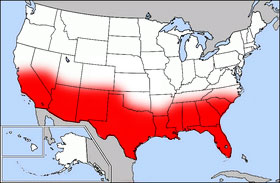 As many of you know, I’m a big fan of demographics. Generally, I think, that how populations grow or stagnate and how they migrate ultimately trumps just about any effort, public or private, to order society.
As many of you know, I’m a big fan of demographics. Generally, I think, that how populations grow or stagnate and how they migrate ultimately trumps just about any effort, public or private, to order society.
I’ve speculated without any data several times that the Great Recession might have some pretty profound impacts on this country. Now there is some data that indicates, at least for the time being, decades of trends in US population movements are reversing.
The Wall Street Journal reported several days ago that in the 2008-2009 time frame the Sun Belt lost its allure:
Census data released Tuesday portray a sharp shift in migration during the depths of the recession, from July 2008 to July 2009. With home prices slammed and few jobs available in any state, people from Massachusetts to California decided to stay put or go back where they came from.
The Las Vegas metropolitan area lost about 1,300 residents to other areas. That compares with an annual inflow of 54,000 people during the height of the real-estate boom, and marks the first year of out-migration the city has seen in at least a century. The Orlando area swung to an outflow of about 4,300 from an inflow of 52,000 in 2004-2005.
The shifts represent a radical departure from the migration patterns that had made cities such as Las Vegas and Orlando some of the country’s fastest-growing. For decades, people have been leaving colder Northeastern and Midwestern states, either to retire or to chase better weather and jobs in the South and West.
“It’s unprecedented to see areas like Las Vegas and Orlando, just blue-chip destinations for anybody who wanted to move, to stop and stay stopped over a couple of years,” said William Frey, a demographer with the Brookings Institution, a Washington think tank.
Now this is a one-year snapshot so drawing any conclusions about the long-term implications would be rash to say the least. It would be just as foolish to disregard them. Once a city like Orlando or Phoenix or Las Vegas loses its mojo as it were, it’s not that easy to get it back. As people decide the grass isn’t any greener in those places the word spreads and the impulse to pull up stakes and move abates.
Migration stoked the growth fires in Sun Belt economies. Jobs were created to satisfy the demand from booming populations not from the organic growth of local companies. Choke off the immigrants and the job machine starts to sputter. Plumbers, electricians and dog groomers to name just a few no longer have a growing base from which to draw customers.
Talk to the locals in most of the Sun Belt communities and you will find an abiding faith in things returning to the status quo ante. They will tell you that their communities have been through this before and once the economy righted itself, the old trends reemerged. I’m not sure I would wager a lot of money on that not happening but here are a couple of reasons that it might be different this time:
- A lot of potential migrants are locked into their current residences. The phenomena of negative equity and, I believe, a permanently altered real estate market locks a lot of people into their communities.
- The economic disasters in the Sun Belt states will make potential immigrants think twice before pulling up stakes. Even if a job is waiting, does it make sense to move to a state teetering on the edge of bankruptcy?
- Younger generations are not as prone to moving as were the Baby Boomers and for that matter their parents. They are staying closer to home and families which might be a good social trend but will retard growth in the Sun Belt.
- The Boomers are going to think twice before retiring to the warmer climes. They want to be nearer their children and grandchildren but more than that, they probably don’t want to bet their retirement on states that might not be able to offer them the safety nets they’ll eventually need.
It’s going to be a trying time for the Sun Belt over the next few years. The adjustment to lower growth is going to test their political systems and assumptions upon which they’ve organized their economies. Right now, I suspect that the major strategy is wait until things return to normal. Unfortunately, I don’t think that a Plan B exists at this point in time.
- Bulenox: Get 45% to 91% OFF ... Use Discount Code: UNO
- Risk Our Money Not Yours | Get 50% to 90% OFF ... Use Discount Code: MMBVBKSM
Disclaimer: This page contains affiliate links. If you choose to make a purchase after clicking a link, we may receive a commission at no additional cost to you. Thank you for your support!


Leave a Reply